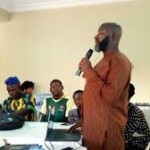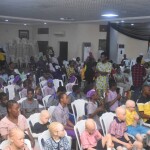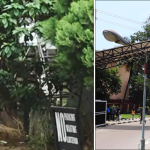Nigeria’s local governments lack capacity to domesticate the national disability law. Now they have inertia adopting its policy framework for local government. But the drafter, Adebukola Adebayo, a World Bank consultant to Nigeria’s disability commission, looks on the bright side
Why did it take this long to have this framework?
Adebayo: Many of the disability laws at the state and the national levels all committed the error of not including local government in their disability laws’ governance frameworks. Apart from setting up disability agencies I doubt if the laws have any frameworks. Maybe it was expected the LG will enact their by-laws. But you and I know the LGs don’t have that capacity. That’s why those of us in advocacy took this initiative to put the framework together and sell it to the NCPWD and ALGON. So if some states are yet to even enact their disability laws by now, we can’t blame LGs for not doing anything at all. But while the frenzy of the Discrimination Act enactment is still on, it’s good to draw the LG into it—to strike while the iron is still hot.
How many LGAs have adopted the framework so far?
Adebayo: We started a pilot in Lagos. At Ojodu LCDA, Eti Osa, and another in Ikorodu. Ojodu is planning to put it into by-law now. And advocacy is still on-gong. After we (I developed the framework in collaboration with JONAPWD when i was its chairman; the Hope Inspired Foundation for Youth and Women with Disabilities ran it on its platform) piloted in Lagos, the foundation got additional funding from the Disability Rights Fund to expand it to Oyo, Plateau, Gombe, and the FCT. Groups were set up in those states to push for at least three LGAs in each of those states to adopt the framework. As the programme is rounding off this month, none of those states have been able to get their LGAs to adopt it.
How will you make others buy in, and adopt the framework? The good thing is we have got ALGON and the NCPWD to adopt it. We are pushing it from both ends. This will accelerate the potential of it being adopted by LGs across the nation. We are also bringing in our development partners like the World Bank. This is to ensure resources are put behind the process to encourage the LGs to adopt it. We are hoping many more will do. ALGON and the NPWD made input into the document. So we believe with our approaches, the framework will be adopted across the country.
The 1999 Constitution was used to give the framework some authority. Why had nobody pressed home those provisions to make local government inclusive before now?
Adebayo: The framework is a synthesis of provisions in Schedule 4 of the 1999 Constitution and relevant provisions of the Discrimination Act. It shows we are not bringing in anything new. We are only trying to make the constitutional functions of the LG more disability-sensitive. In the Constitution, you will see the word ‘destitute’, and that is the closest to disability. You know we can’t bury the entire gamut of disability in that single word.
Why nobody thought of it before now?
Adebayo: Development is not static. More and more will happen in the future. Even what we are doing now, other people may later look into it, and make improvement. But that will be after it has been tested, tried, and implemented. Since we can’t start amending the Discrimination Act now, this is the only thing we can do—like an annexure to the disability laws at the federal and state levels. There’s no other time better than now to do it. In two years from now we will have been able to get most—if not all—the LGAs to buy into it. We may not know why nobody did it before; we are happy we just did it right now. And we are getting all the positive responses we need. The current ES of the NCPWD has bought into it, and he is ready to put some budget behind it to kick-start the process at the LG level. Even now that the amendment of the Constitution is going on, it’s a golden opportunity for us to push into the amendment the need to assign disability responsibilities to the state and local governments. Those of us contributing to the amendment could push for that. The Nigerian Constitution is one of those not explicit about disabilities. The South African Constitution is very specific about disability. Beyond political participation, we need to assign responsibility of disability to all levels of government.
Section 2.3.2 prescribes the Washington Group survey methodology to register disability. Most states' disability laws and the Discrimination Act do the same, especially with disability registration and certification. Are the functions not overlapping?
Adebayo: If you look at the way the state and the NCPWD have been going about it, you will see why data collection has not been sustainable and impactful. Thy have not been able to establish a disability data management structure. To do that, the structure must have its roots in LG. And it’s a lifelong thing. People acquire disabilities daily. The closest place they can go to register is the LG. Look at Lagos which had its disability law in 2012—it has not been able to establish a database. The new ES at the NCPWD has showed commitment to establishing a broad disability database. The way to go about it is not by survey. It’s using the structure in LG as prescribed in the frame work. They could also make it easy for people online. That can help us capture, on continual basis, disability data. Surveys are for studying trends—not for building a database. Not even population census. Its enumeration tools are too narrow. Likewise the NIN. We can only use the NIN structure as a starting base, and the NCPWWD will take disability-specific data. So all levels of government will have access. So whenever, for example, LASODA needs data, it can log on, and mine from it. This may require a MoU between the NCPWD, states and LGs. But the process of data collection will be unified.
About duplicating certification?
Adebayo: Data collection doesn’t stop any level of government from issuing disability certificates if the states so wish. But I think it’s not necessary. If the NCPWD issues certificates of disability, states may not issue again. But if they choose to, data collection doesn’t stop them. What matters is a unified data collection process that ensures reliability of data.







